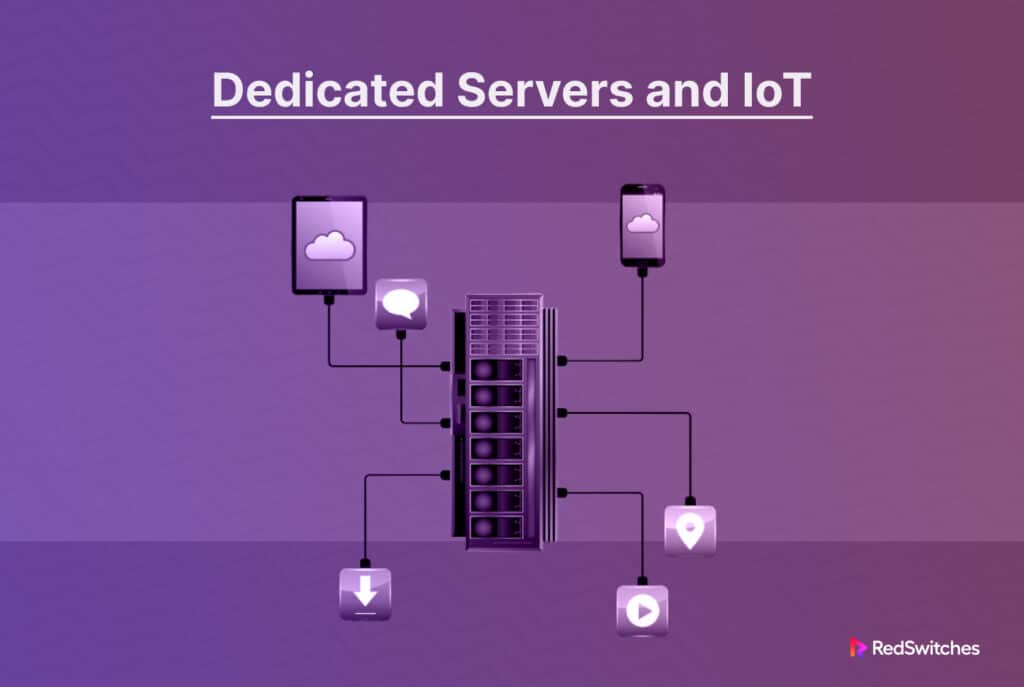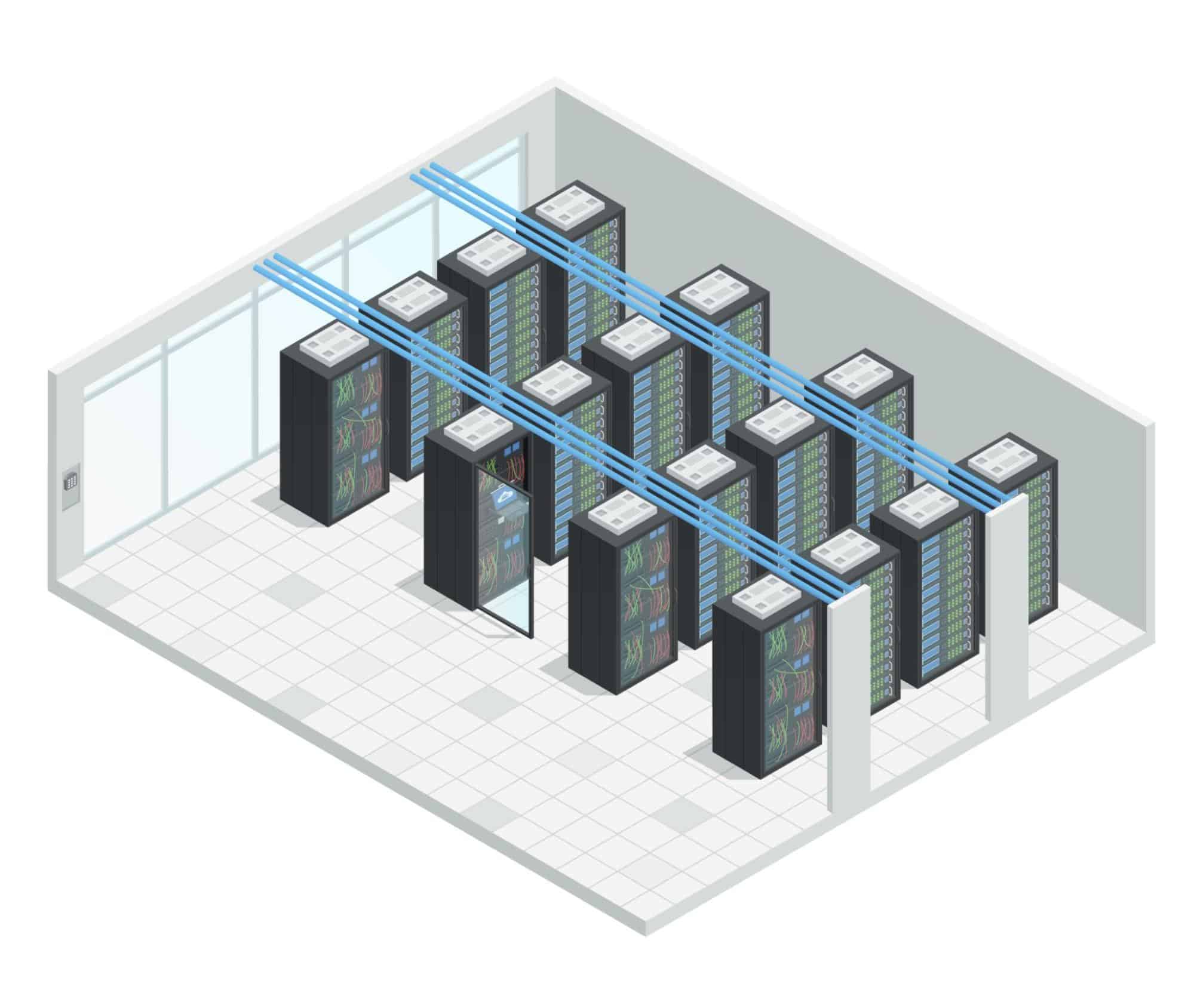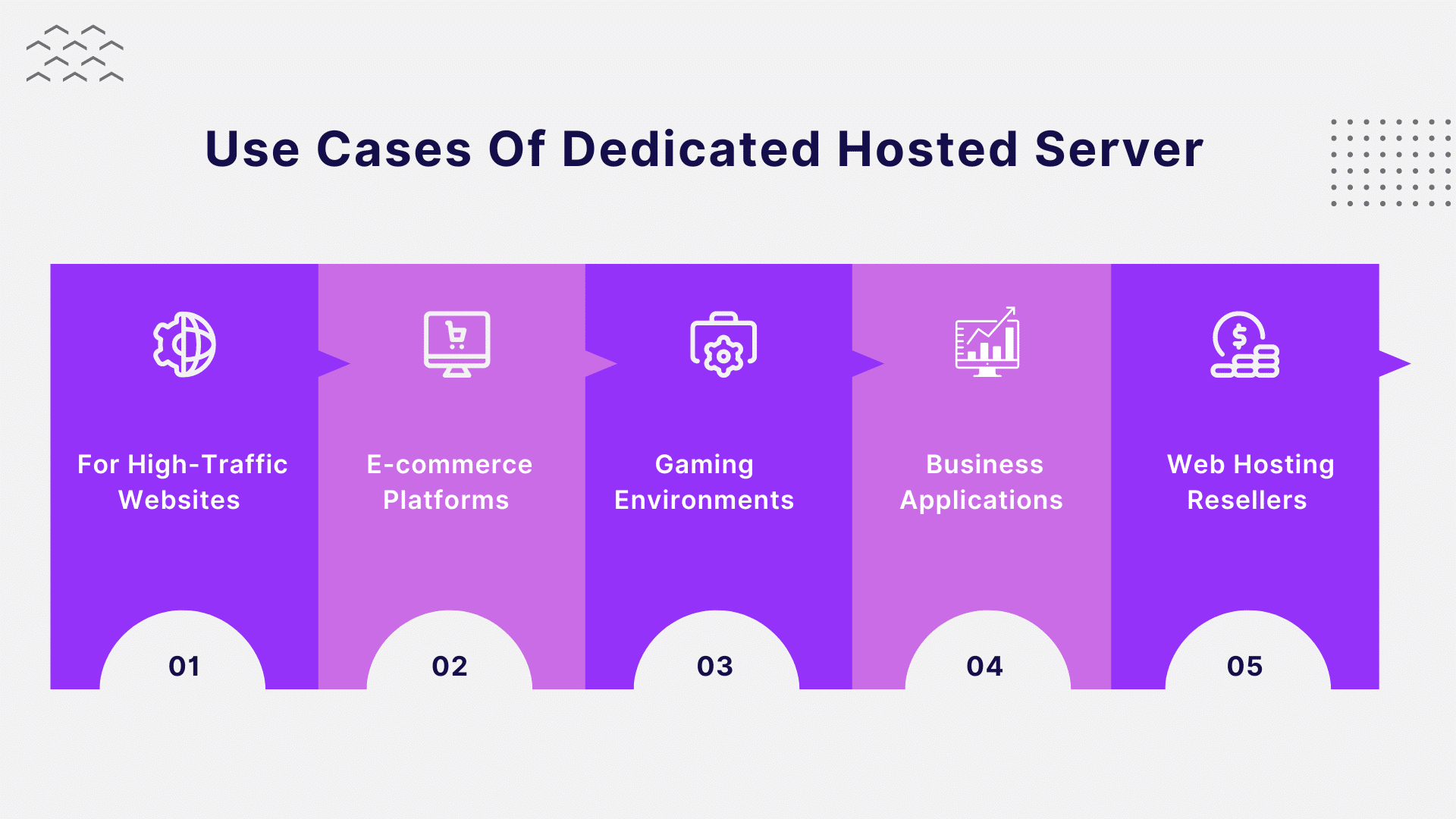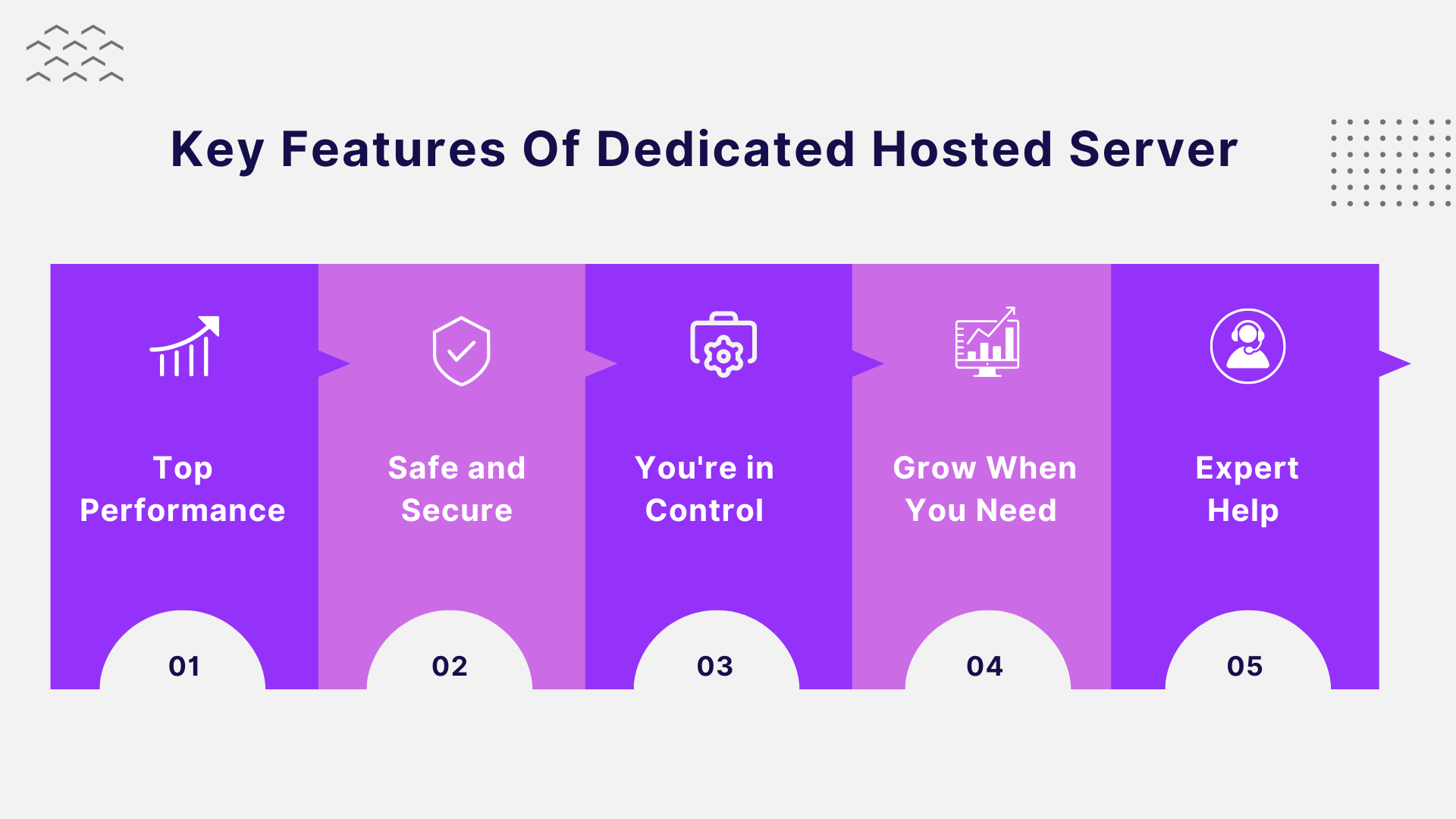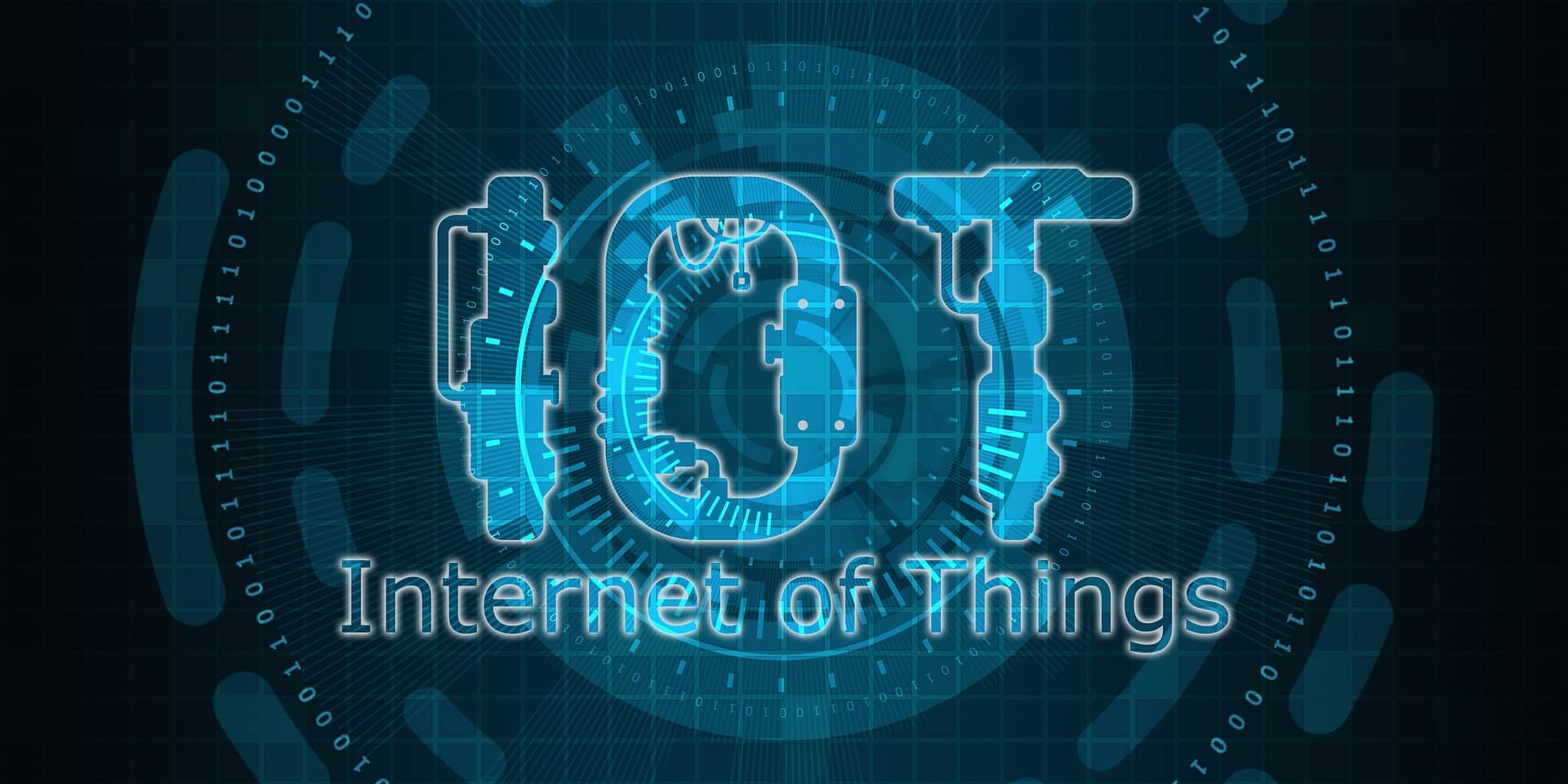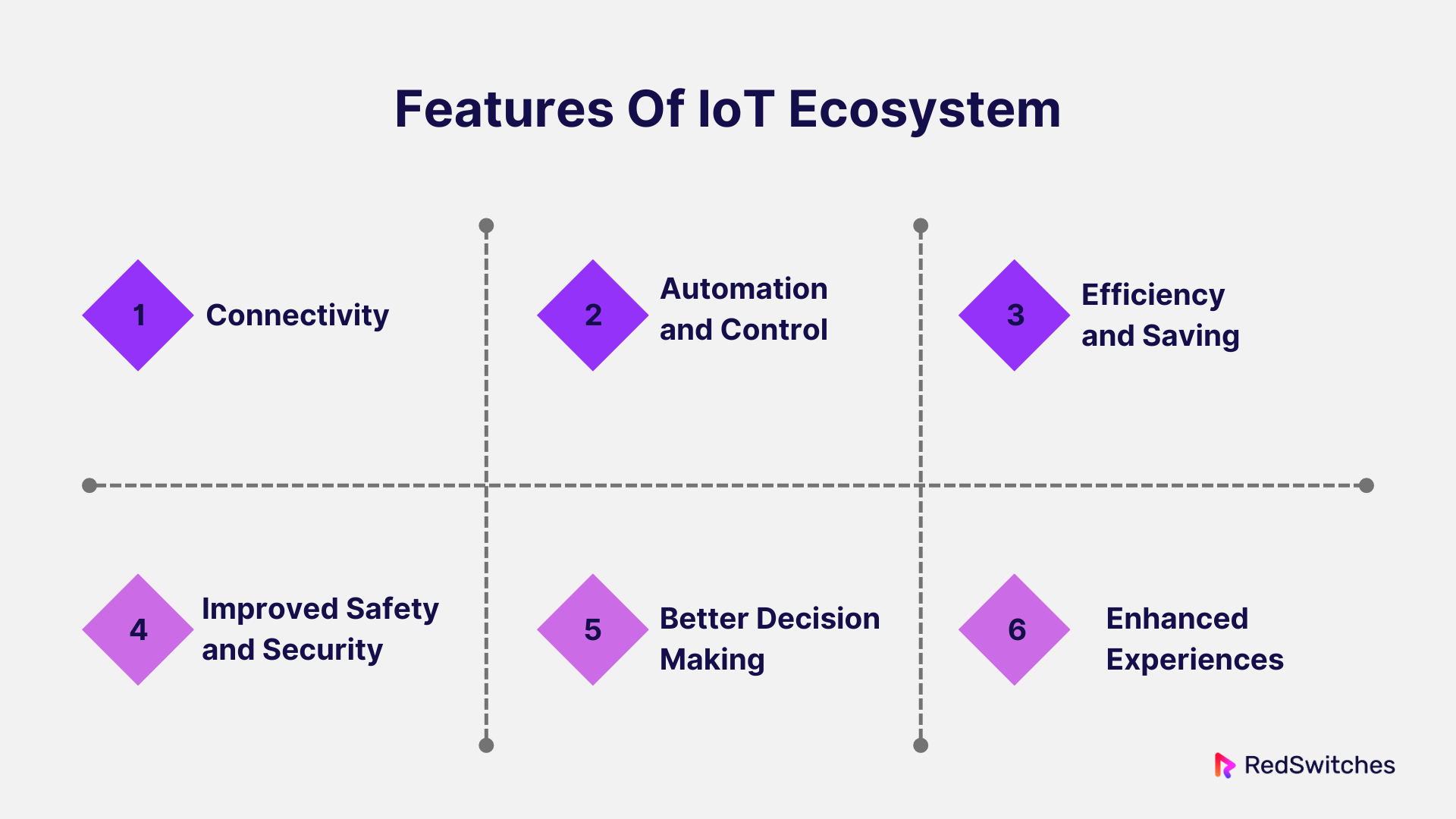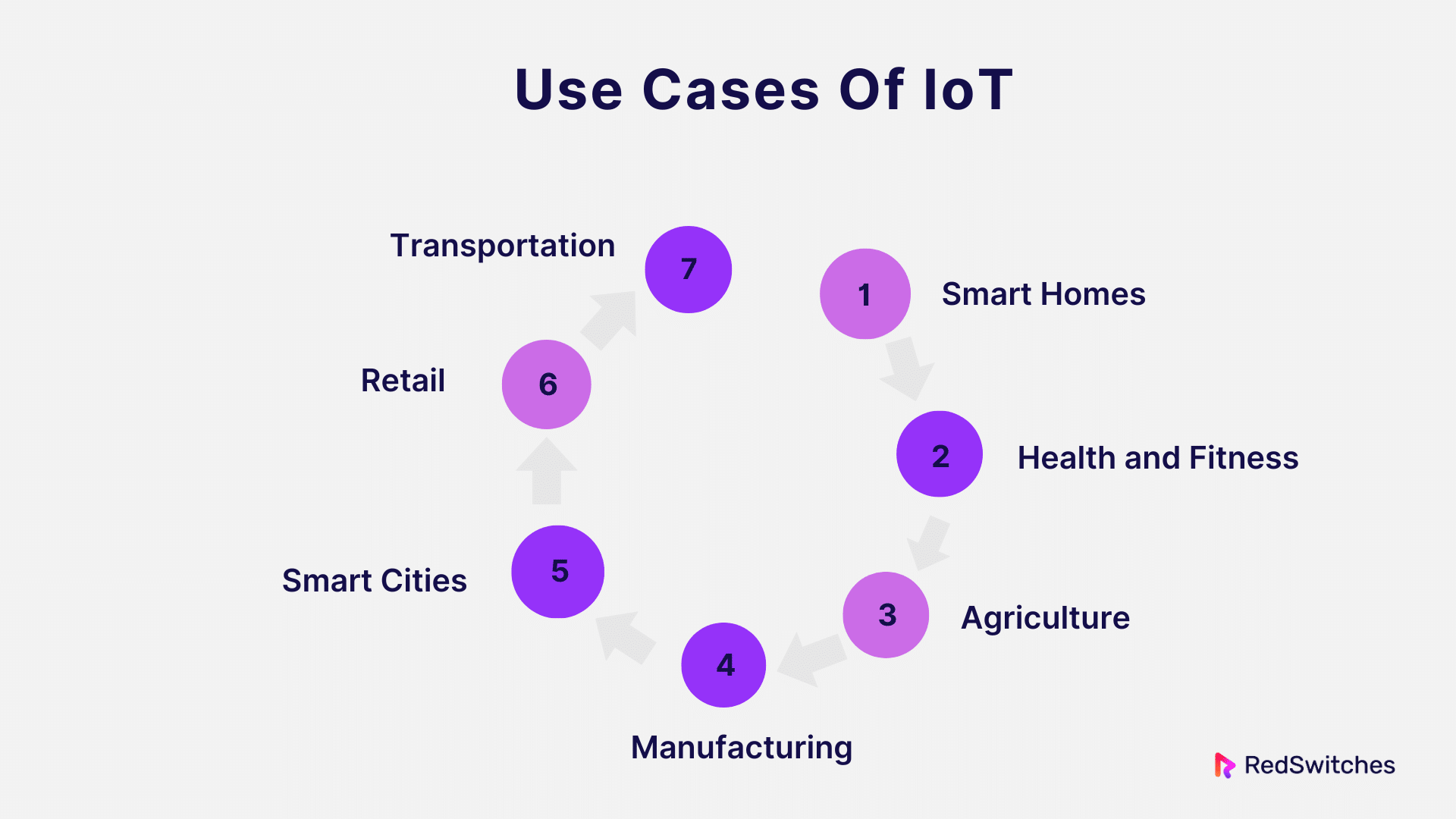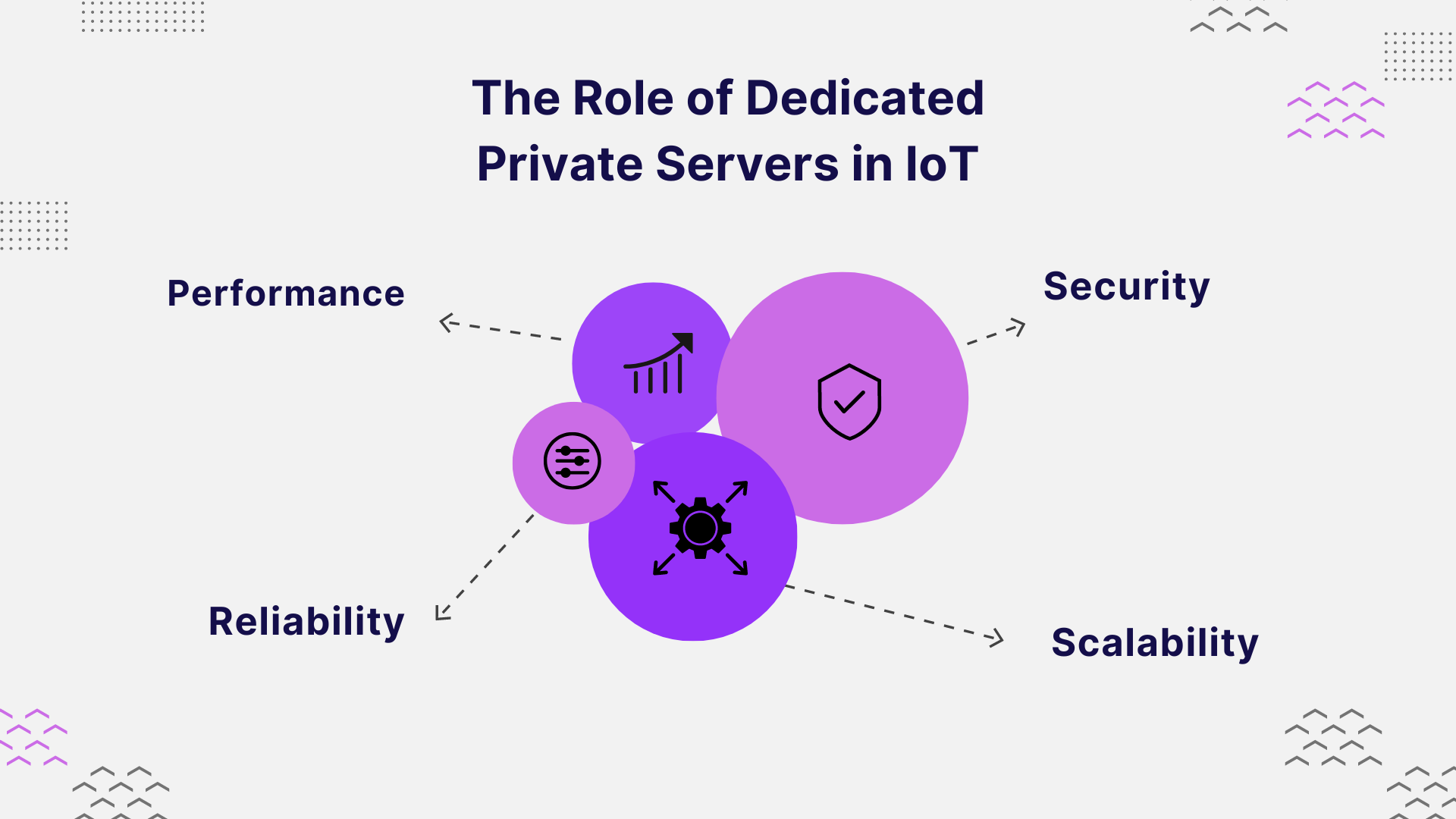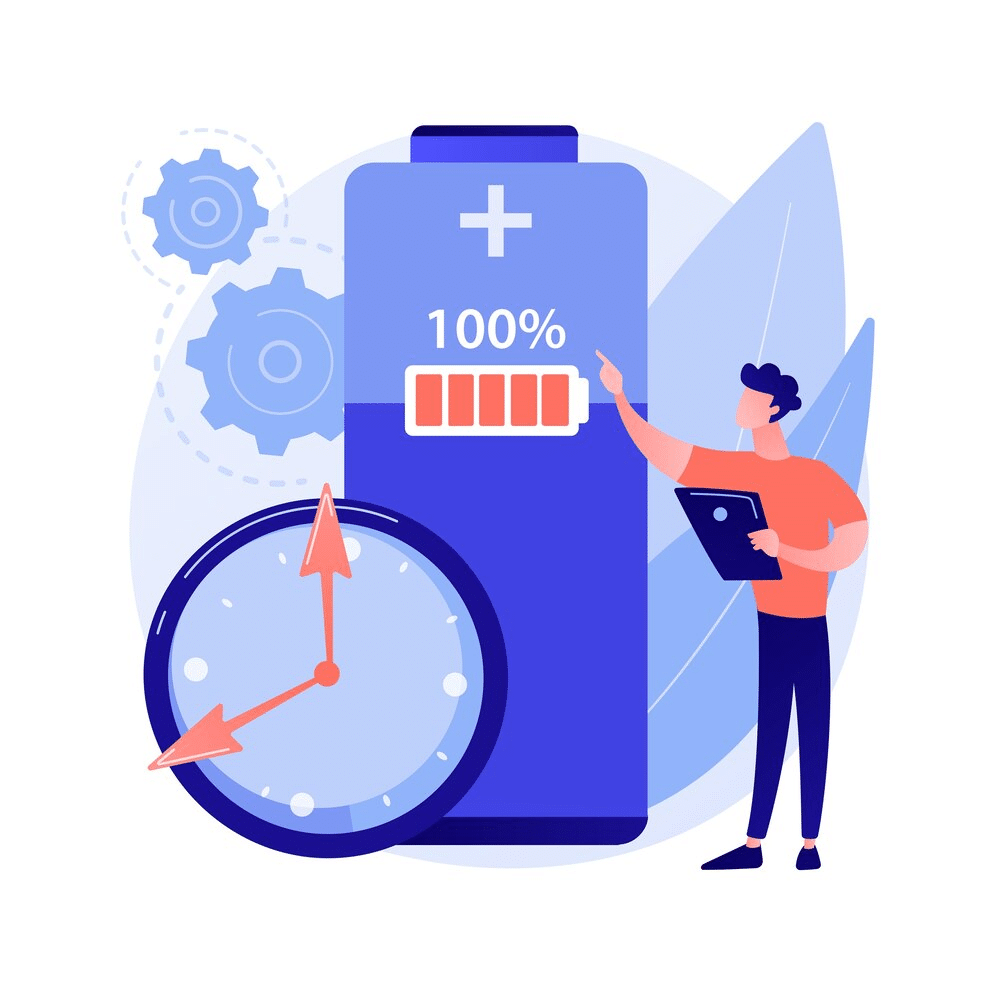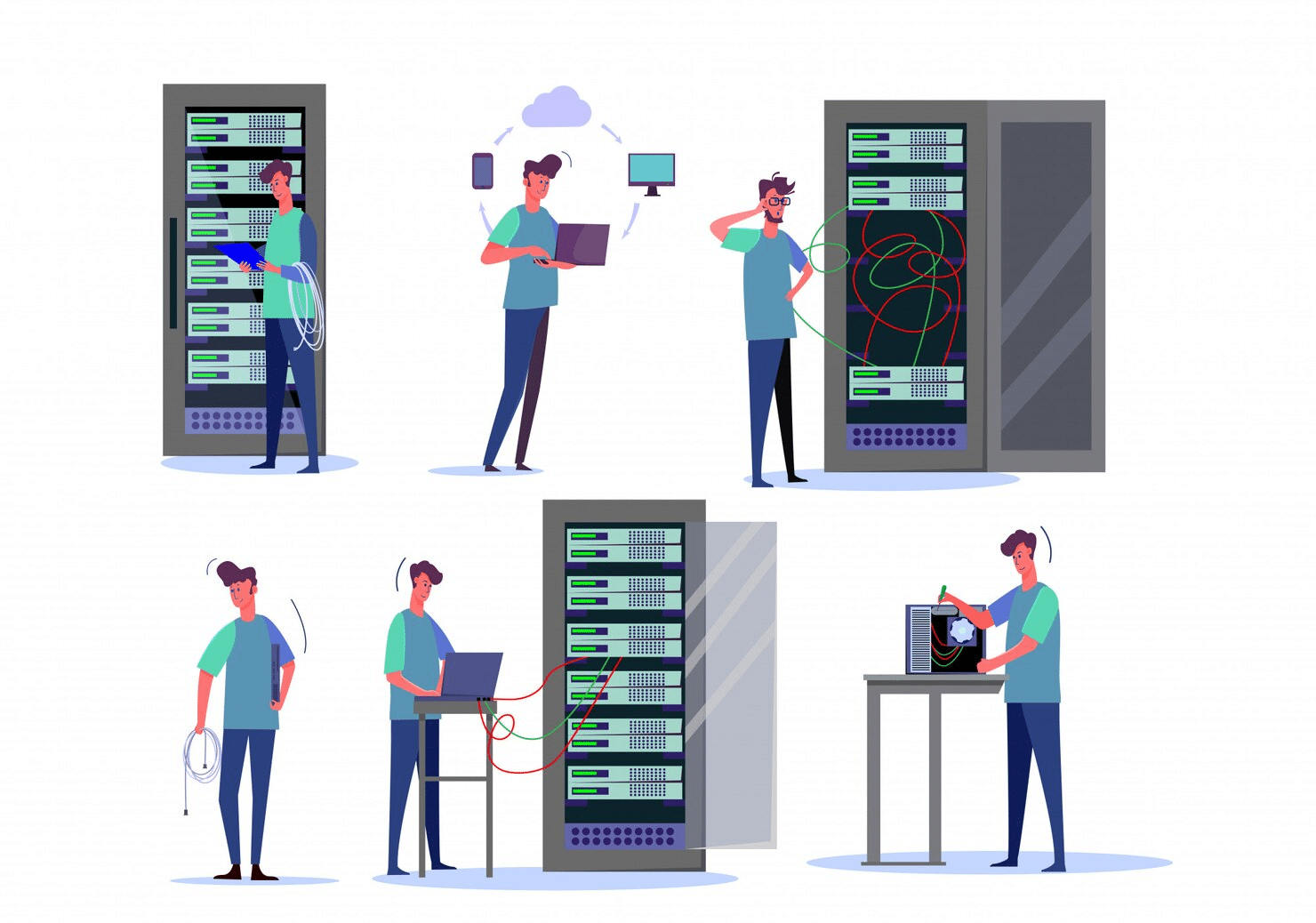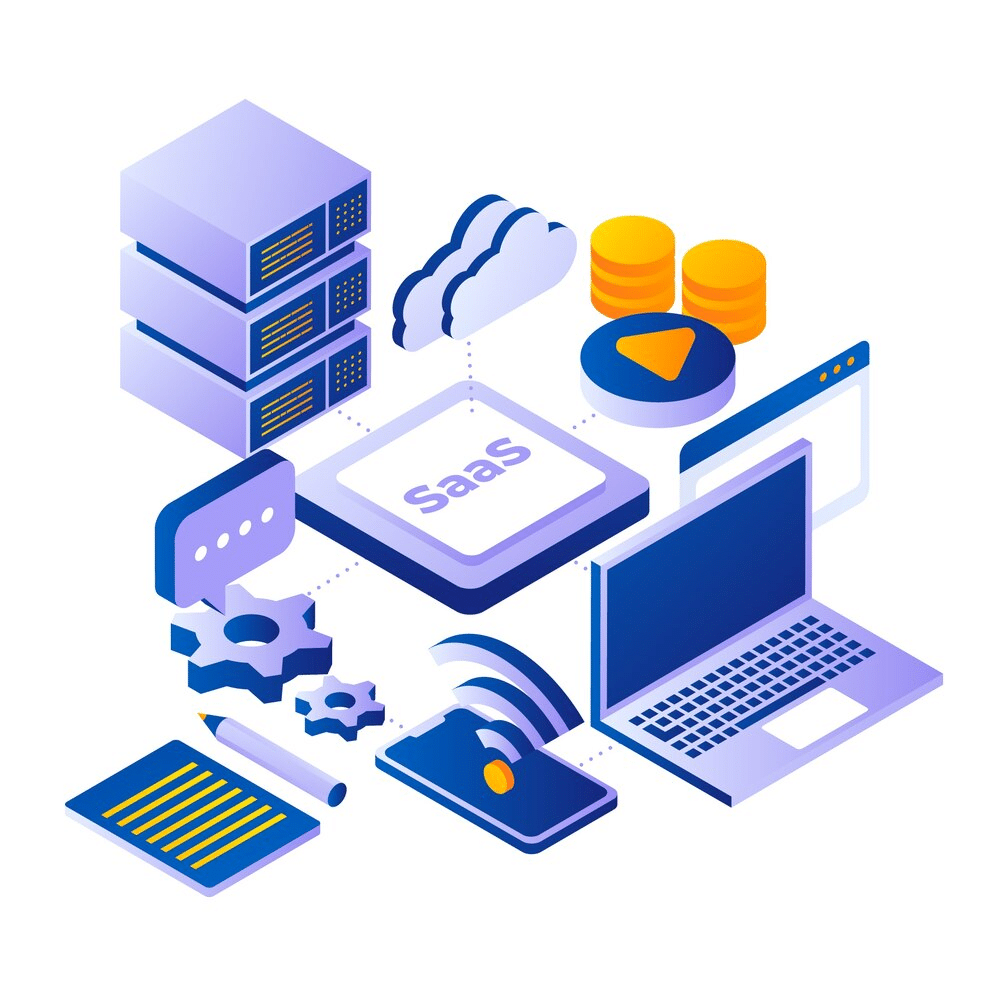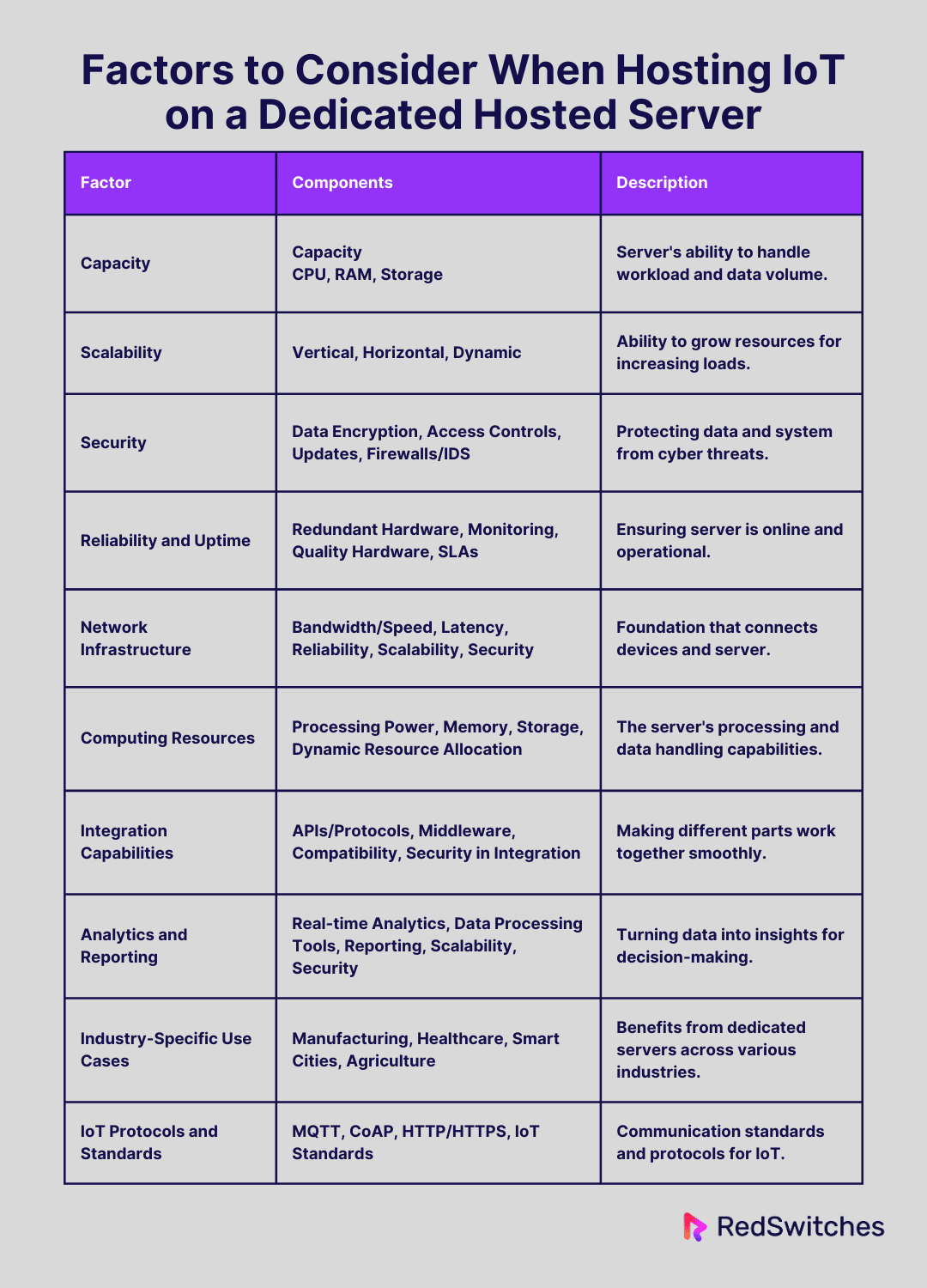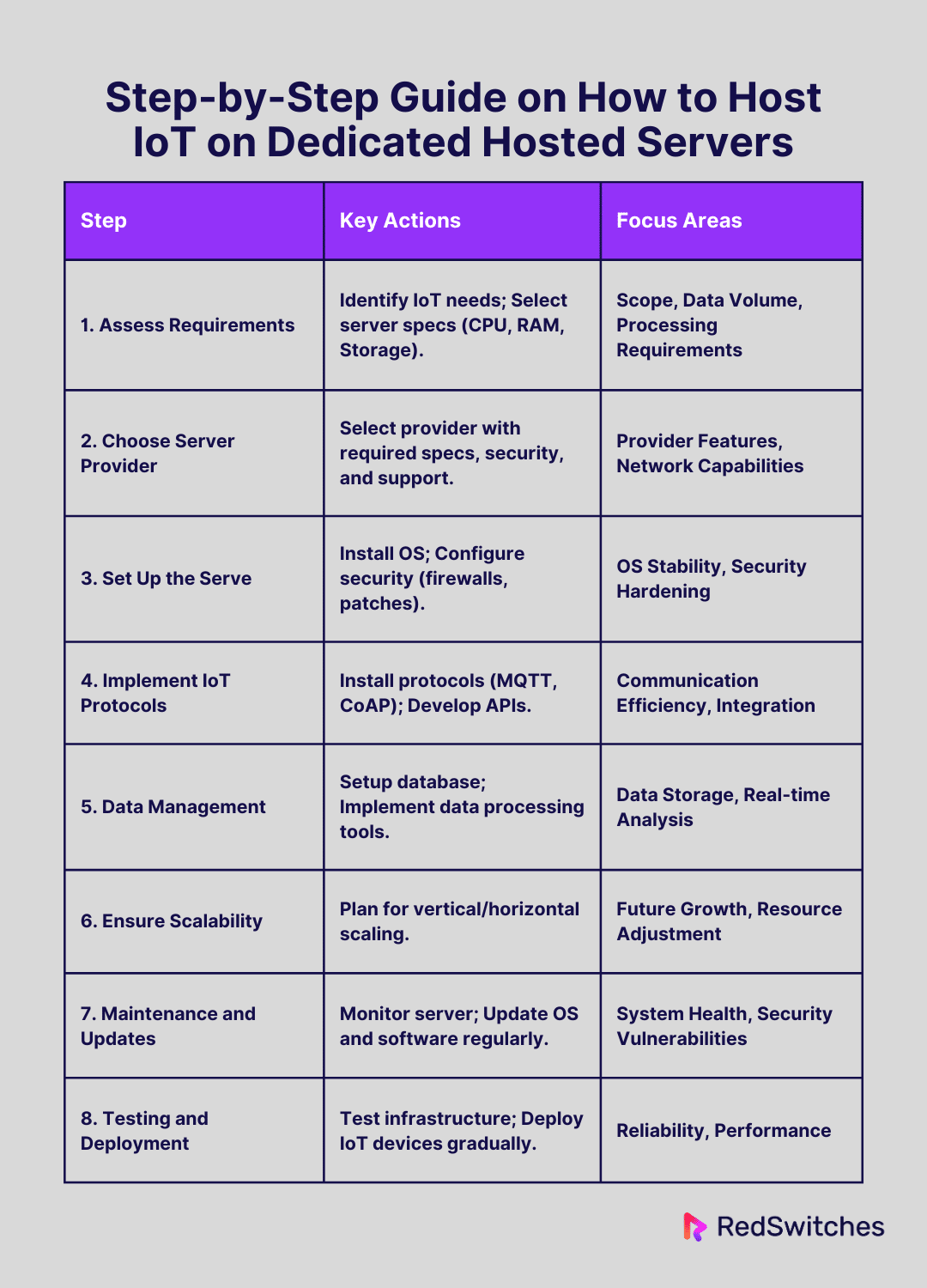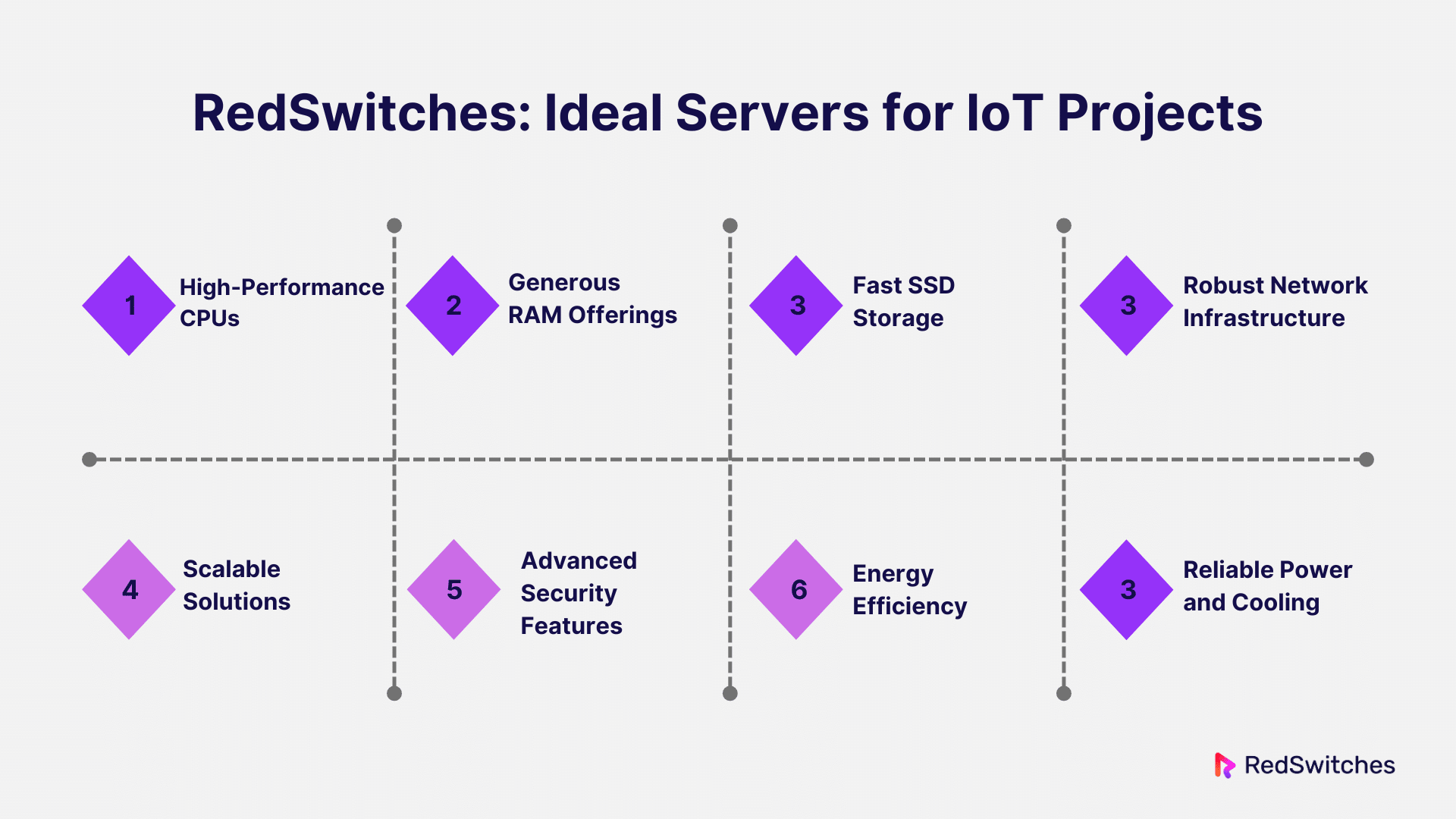Key Takeaways
- Dedicated servers offer a secure, private environment essential for IoT’s high performance, handling massive data volumes efficiently.
- They provide enhanced security with custom firewalls and encryption, safeguarding sensitive IoT data against cyber threats.
- Users can optimize their IoT applications’ performance and security settings with complete control over the server.
- Scalability in dedicated hosted servers ensures IoT applications can grow seamlessly with increasing device numbers and data volumes.
- IoT technology transforms various sectors by enabling smart homes, healthcare monitoring, efficient agriculture, and smart city management.
- Hosting IoT on dedicated hosted servers involves careful planning, including assessing requirements, selecting the right provider, and implementing robust security measures.
- Key protocols like MQTT, CoAP, and HTTP/HTTPS facilitate efficient communication between IoT devices and servers.
- Real-time analytics and scalable data processing tools are crucial for turning IoT-generated data into actionable insights.
- Continuous monitoring and regular updates are essential for maintaining security and performance in IoT infrastructures.
- RedSwitches offers high-performance CPUs, generous RAM, fast SSD storage, and scalable solutions ideal for IoT projects, emphasizing security and reliability.
In today’s world, the Internet of Things (IoT) is changing how we live and work. IoT devices, from smart homes to smart cities, make life easier and more efficient. But, for all these devices to work well, they need a strong and secure place to send their data. This is where dedicated hosted servers come in.
These servers are only for one user or task, making them more reliable and safe than shared ones. They handle the huge amount of data IoT devices produce without slowing down or risking security.
With the number of connected devices expected to reach over 75 billion by 2025, the need for dedicated servers for IoT is clearer than ever. This introduction explains why servers are key for IoT. They ensure devices can talk to each other quickly and safely, making our smart world possible.
Table of Contents
- Key Takeaways
- What Is A Dedicated Server?
- What Is an IoT?
- Dedicated Servers and IoT: Hosting for the Internet of Things
- Factors to Consider When Hosting IoT on a Dedicated Hosted Server
- Step-by-Step Guide on How to Host IoT on Dedicated Hosted Servers
- RedSwitches: Ideal Servers for IoT Projects
- Conclusion
- FAQs
What Is A Dedicated Server?
Credits: Freepik
A dedicated hosted server is a powerful computer serving a specific task or user. Unlike shared hosting, where many users share the same resources, a server is all yours. It means you get all the power, speed, and space to yourself. This setup is perfect for tasks that need a lot of resources or high security.
Use Cases Of Dedicated Hosted Server
Dedicated hosted servers are powerful tools that support various applications across different fields. They offer the reliability, control, and performance necessary for tasks that demand robust infrastructure. Let’s explore some of their use cases, highlighting their versatility and importance in today’s digital landscape.
For High-Traffic Websites
Websites that attract many visitors need a server that can handle the load. A server ensures your site remains fast and accessible, even when traffic spikes.
E-commerce Platforms
Online stores require secure and efficient environments to handle transactions and customer data. Dedicated hosted servers provide the necessary security measures and performance to support large volumes of sales and visitors.
Gaming Environments
Multiplayer online games allow players worldwide to connect. These games need servers that can handle intense traffic and provide low latency. Gaming servers are perfect for this, offering gamers a seamless and enjoyable experience.
Business Applications
Companies rely on applications for day-to-day operations. These can range from customer relationship management systems to financial software. Dedicated hosted servers offer businesses the security and reliability to run these critical applications smoothly.
Also Read: Scalability and Dedicated Servers: A Guide for Small Business Owners in 2024
Web Hosting Resellers
Some businesses host websites for others. They use servers to offer their clients reliable and high-quality hosting services.
Each use case demonstrates the flexibility and power of dedicated hosted servers. They are essential for anyone needing a reliable, secure, high-performing online presence or service. Whether managing a busy website, running an e-commerce platform, hosting a game server, or relying on business applications, servers provide the foundation you need to succeed.
Key Features Of Dedicated Hosted Server
Dedicated hosted servers give you the power and privacy you need for your online projects. Let’s break down what makes them stand out.
Top Performance
Think of a dedicated hosted server as your private supercomputer online. It doesn’t share its power with anyone else. This means your website or app can run fast, no matter how many people use it.
Safe and Secure
Your data on a server with dedicated resources is like money in a safe. You get to decide who can come in and out. You can add as many locks and security cameras (like firewalls and encryption) as you need. This keeps your online space safe from hackers.
You’re in Control
Having a server with dedicated resources is like having your own house. You can paint the walls, move furniture around, and play music as loud as you want. You choose the software and settings that are right for you.
Grow When You Need
As your online presence grows, your server can, too. More visitors or data? No problem. You can upgrade your server to keep everything running smoothly.
Expert Help
Whenever you need help, a team is ready to help. Think of them as your personal tech support. They know your server inside out and can fix issues fast.
Servers offer a mix of speed, safety, and control. They’re perfect for anyone who wants their online project to have room to grow without worrying about slow load times or data breaches. Whether running a big online store, a popular game, or a critical business application, a dedicated server keeps everything running as you want.
What Is an IoT?
Credits: Pixabay
IoT stands for the Internet of Things. It’s a term that describes a network of physical objects—things—that are embedded with sensors, software, and other technologies. The purpose is to connect and exchange data with other devices and systems over the internet. These objects include household appliances, cars, wearable devices, and buildings.
IoT makes these things smarter. It allows them to send and receive data, making it possible to control them remotely or gather information on their use. This technology is changing how we live, work, and interact with the world around us by making our environments more responsive. IoT is about making our lives easier and more efficient through smarter technology.
Features Of IoT Ecosystem
The Internet of Things (IoT) brings a lot of cool features to our world. Here’s a look at some of them.
Connectivity
IoT devices are all about staying connected. They use the internet to send and receive data. This lets your gadgets talk to each other and you. It’s like having a chat with your coffee maker or car.
Automation and Control
Thanks to IoT, many things can work independently without you needing to do much. You can set your thermostat from your phone or turn your lights on when you get home. It’s like having magic at your fingertips.
Efficiency and Saving
IoT makes things more efficient. It can help save energy by turning off lights when no one is in the room. Or it can track how much water your garden needs, so you don’t waste any. It’s all about using less to do more.
Improved Safety and Security
IoT can also keep us safe. Cameras and sensors can watch over your house. Wearables can monitor your health. If something goes wrong, these devices can call for help. It’s like having a guardian angel.
Better Decision Making
With all the data IoT devices collect, we can make smarter choices. We can understand patterns in our energy use or see how busy a road is before we leave home. It’s about knowing more so we can decide better.
Enhanced Experiences
IoT can make life more fun and convenient. Your fridge can suggest recipes based on what’s inside. Or your house can play your favorite music when you enter. It’s about adding a little extra joy to your day.
IoT is transforming our lives in many ways. From how we save energy to how we keep safe, it’s making everything smarter and more connected. And that’s pretty exciting.
Also Read 13 Advantages of Java Programming Language
Use Cases Of IoT
The Internet of Things (IoT) is changing our world in many fascinating ways. Let’s dive into some of its use cases, showing how it’s making a difference in our lives and work.
Smart Homes
Imagine living in a house that knows your needs. Lights adjust automatically to save energy and set the mood. Your thermostat learns your schedule to keep your home comfortable when you’re there and save energy when you’re not. Security cameras and smart locks keep your home safe. All of these are controlled from your smartphone, no matter where you are. This is the reality of smart homes powered by IoT.
Health and Fitness
Wearable devices like fitness bands and smartwatches use IoT to help us stay healthy. They track our steps, heart rate, sleep patterns, and more. This information can be used to improve our daily routines and health habits. Doctors can also monitor patients remotely, making healthcare more accessible and efficient.
Agriculture
Farmers use IoT to make farming more precise and productive. Sensors can monitor soil moisture, crop growth, and weather conditions. This data helps farmers make better watering, planting, and harvesting decisions. IoT makes agriculture more efficient, reducing waste and improving yields.
Manufacturing
In factories, IoT helps create smart manufacturing processes. Sensors track the health of machinery to predict when they might fail. This allows for repairs before breakdowns occur, reducing downtime. IoT also helps manage inventory and improve the production line’s efficiency.
Smart Cities
Cities worldwide are using IoT to become smarter and more efficient. Sensors manage traffic flow, reducing congestion. Smart street lights save energy. Systems monitor air and water quality to keep cities healthy. IoT is making cities more livable and sustainable.
Retail
IoT is changing the way we shop. In stores, smart shelves monitor inventory in real time. Beacons send personalized offers to customers as they shop. Online, IoT helps manage logistics, ensuring products are in stock and delivered quickly.
Transportation
IoT is making transportation smarter and safer. In cars, sensors monitor engine health and alert drivers to potential problems. Cities use IoT to manage public transportation, making it more efficient. Autonomous vehicles, guided by IoT, promise to make driving safer and reduce traffic jams.
Each of these use cases shows the power of IoT to transform our lives. By connecting the physical and digital worlds, IoT makes our environments smarter and more responsive. It’s exciting as we see more innovations unfold, making our world more connected and efficient.
Dedicated Servers and IoT: Hosting for the Internet of Things
In the fast-paced digital world, the Internet of Things (IoT) and dedicated private servers combine to create a powerful duo. This combination is essential for hosting the myriad devices and applications that form the backbone of our modern, interconnected life. Let’s delve into how dedicated private servers and IoT are shaping the future of the Internet.
The Role of Dedicated Private Servers in IoT
Dedicated private servers provide the muscle behind IoT’s vast and growing network. These servers offer a private, secure, powerful environment for running IoT applications. Unlike shared hosting, where resources are split among multiple users, servers are reserved for a single client. This exclusivity ensures IoT applications have the necessary resources to operate smoothly and efficiently.
Why Dedicated Private Servers are Key for IoT solutions?
Performance
IoT devices generate massive amounts of data. Dedicated private servers can handle this data deluge, processing and analyzing it quickly. This speed is crucial for applications that rely on real-time data to function.
Security
IoT devices often collect sensitive information. Dedicated hosted servers offer enhanced security protocols, such as custom firewalls and encryption, to protect this data. This security is vital in an era where cyber threats are increasingly sophisticated.
Reliability
IoT devices need to be online all the time. Dedicated hosted servers are known for their uptime and reliable solutions. This constant availability ensures that IoT applications are always operational, providing continuous service to users.
Scalability
As the number of IoT devices grows, so does the need for more computing power. Dedicated hosted servers can be upgraded to meet these increasing demands, making them a future-proof solution for IoT hosting.
The synergy between servers and IoT paves the way for a smarter, more connected world. Dedicated hosted servers provide the foundation for the vast IoT device network. Together, they transform our daily lives, making them more convenient, safe, and efficient. As technology advances, the partnership between servers and IoT will continue to evolve, offering even more possibilities for innovation and improvement in our interconnected world.
Also Read Exploring the Future of Technology: A Comprehensive Guide to Hyperscale Data Centers
Factors to Consider When Hosting IoT on a Dedicated Hosted Server
Several factors ensure smooth operation and maximum efficiency when hosting IoT on a server. These considerations help create a secure, reliable, and scalable IoT environment.
Capacity
Credits: Freepik
Capacity is all about the server’s ability to handle workload and data volume. It includes processing power (CPU), memory (RAM), and storage.
Processing Power
For IoT, the server needs a powerful CPU to process data from thousands, or even millions, of devices. This data might need to be analyzed in real time, requiring significant computational resources.
Memory
Adequate RAM is essential for smooth data processing. It temporarily stores data being processed by the CPU. More RAM means the server can handle more data simultaneously, making it faster and more efficient.
Storage
IoT devices generate massive amounts of data. The server must have enough storage to keep this data safe. Plus, the type of storage (SSD vs. HDD) affects how quickly data can be accessed and written.
Scalability
Credits: Freepik
Scalability refers to the server’s ability to grow its resources to accommodate increasing loads. For IoT, scalability is vital because the number of devices and the volume of data can expand rapidly.
Vertical Scalability
Adding more power to your server (CPU, RAM, or Storage). It’s like upgrading your car’s engine for better performance. For servers, this could mean physically adding more hardware or switching to a more powerful server.
Horizontal Scalability
This involves adding more servers to your network to distribute the load. This can mean using multiple private servers to handle data from different device groups or regions for IoT.
Dynamic Scalability
IoT demands can fluctuate greatly. Dynamic scalability allows the server resources to adjust based on current needs in real time. It ensures that the IoT platform remains efficient without overusing resources.
Security
Credits: Pixabay
Security is a top priority when discussing hosting IoT applications on private servers. IoT devices often collect and transmit sensitive data, making them targets for cyber attacks. Here are the key security considerations:
Data Encryption
Encrypting data is like sending a secret message. It ensures that even if someone intercepts the data, they can’t understand it without the key. For IoT, this means encrypting data when it’s stored on the server and as it travels across the internet.
Access Controls
This is about deciding who gets to do what. We can prevent unauthorized users from getting in by setting strict rules on who can access the server and the data. This includes using strong passwords and managing permissions carefully.
Regular Updates
Software updates are like vaccinations for your server. They protect against known vulnerabilities. Keeping the server’s operating system and applications up to date is crucial to fend off attacks.
Firewalls and Intrusion Detection Systems
Think of a firewall as a gatekeeper, controlling incoming and outgoing traffic based on predetermined rules. Intrusion detection systems are like guards, monitoring for suspicious activity and raising the alarm if something looks wrong.
Reliability and Uptime
Credits: Freepik
For IoT applications, being online all the time is often a must. Here’s how private servers ensure high reliability and uptime:
Redundant Hardware
This means having backups for critical components like power supplies and network connections. If one part fails, the system can automatically switch to a backup without going offline.
Monitoring and Maintenance
Regularly checking the server’s health helps catch and fix potential issues before they cause downtime. This includes monitoring disk space, memory usage, and network activity.
Quality Hardware
Using high-quality hardware from reputable manufacturers reduces the risk of failures. This is important for the server and components like hard drives and memory.
Service Level Agreements (SLAs)
Many private server providers offer server SLAs that guarantee a certain amount of uptime. This is a promise that your server will be available and online a specified percentage of the time.
Network Infrastructure
Credits: Freepik
When hosting IoT on a dedicated private server, the network infrastructure is crucial. It is the foundation that connects everything. This explains what makes a robust network for IoT applications.
Bandwidth and Speed
For IoT, your network must move data fast. Think of bandwidth like a highway. More lanes mean more cars can travel at once. In network terms, more bandwidth means more data can move quickly. IoT devices often send data constantly. Your network needs the capacity to handle this without slowing down.
Latency
Latency is about how long it takes data to travel. For IoT, low latency is key. This is because data often needs real-time processing. High latency can mean delays. Delays in critical applications could be problematic. Imagine a smart security system. If there’s a delay in sending alerts, it might be ineffective.
Reliability
A reliable network is always available. IoT devices rely on a constant connection. If the network goes down, data can’t flow. This could lead to missed information or even system failures. Ensuring your network infrastructure is robust and can handle problems is essential.
Scalability
Just like the server, your network must grow. As you add more IoT devices, your network must handle the increased load. This means planning for the future. A scalable network can expand without major overhauls.
Security
Network security is vital. IoT devices can be entry points for attackers. Protecting data as it travels is key. This means using encryption and secure protocols. It also means monitoring the network for suspicious activity.
Computing Resources
Credits: Freepik
For IoT, computing resources are like the brain of the operation. They process and analyze data. Here’s what you need to know about computing resources for IoT hosting.
Processing Power
A dedicated private server for IoT needs a strong CPU. It has to analyze data from many devices. Sometimes, this data is complex. The CPU must work fast to make sense of it all. A powerful CPU ensures your IoT applications run smoothly.
Memory
RAM is where data is stored temporarily. For IoT, having enough RAM is important. It means the server can handle data from many devices at once. More RAM also helps with speed. It lets the server process data faster.
Storage
IoT devices generate lots of data. Your server needs enough storage to keep it all. But it’s not just about quantity. The type of storage matters too. SSDs are faster than HDDs. They help in quickly accessing and writing data.
Dynamic Resource Allocation
IoT needs can change fast. Sometimes, you have lots of data coming in. Other times, it might be less. Dynamic resource allocation means the server adjusts its resources. This helps in using just what is needed. It makes the system efficient and saves resources.
Integration Capabilities
Credits: Freepik
Integration is key when setting up IoT on a dedicated private server. It’s about making different parts work together smoothly. This part explains what you need for good integration.
APIs and Protocols
APIs (Application Programming Interfaces) are like bridges. They let different software talk to each other. For IoT, APIs need to be flexible. They should support various protocols IoT devices use. Protocols are sets of rules for data exchange. MQTT and HTTP are common in IoT. They help devices communicate efficiently.
Middleware
Middleware is software that connects different systems. It helps manage communication between devices and servers. Think of it as a translator. It makes sure the server understands messages from devices. Middleware can also handle data formatting and protocol translation. This makes integration smoother.
Compatibility
Devices and software must work together. This means they need to be compatible. When choosing technology for IoT, think about what you already use. The new tech should integrate well with your existing setup. This reduces problems and saves time.
Security in Integration
Secure integration is critical. As you connect devices and systems, you create potential risks. Each connection is a possible entry point for attackers. Use encryption and secure APIs. This protects data as it moves between devices and servers.
Analytics and Reporting
Credits: Pixabay
Analytics and reporting turn data into insights. For IoT, this is about understanding what the data means. This section covers what’s important for analytics and reporting.
Real-time Analytics
IoT often needs fast data analysis. This is real-time analytics. It allows for immediate action based on data. For example, real-time analytics can manage traffic flow in smart cities based on current conditions. The server must have the power to analyze data quickly.
Data Processing Tools
Tools for data processing are essential. They help organize and analyze data. Some tools can handle large volumes of data fast. They make it easier to spot trends or issues. Choosing the right tools is key to effective analytics.
Reporting
Reporting is about sharing insights. Good reports are easy to understand. They show what’s important without unnecessary detail. For IoT, reports might show trends, performance metrics, or alerts. They help decision-makers understand what’s happening.
Scalability in Analytics
As IoT grows, so does the data. Your analytics system must grow too. It should handle more data without slowing down. This means using scalable tools and databases. They can expand as your data grows.
Security for Analytics
Data in analytics is valuable. It can also be sensitive. Protecting this data is essential. Use encryption and access controls. Ensure only authorized users can see or change data. Security measures protect your insights and maintain trust.
Industry-Specific Use Cases
Credits: Freepik
Hosting IoT on dedicated private servers is vital across various industries. Each sector has unique needs and applications for IoT technology. This part looks into how different industries benefit from dedicated IoT servers.
Manufacturing
In manufacturing, IoT is about efficiency and automation. Sensors on machines gather data on performance and wear. This data helps predict when a machine might fail. It means repairs can happen before breakdowns. This reduces downtime and saves money. A dedicated private server processes this data quickly. It ensures the manufacturing line keeps running smoothly.
Healthcare
Healthcare uses IoT to monitor patients and manage devices. Sensors can track heart rate, blood pressure, and more. This data helps doctors see how patients are doing in real-time. It can even alert them to problems early. A dedicated hosted server ensures this data is handled securely and quickly. Patient care becomes better and more efficient.
Smart Cities
Smart cities use IoT to improve living conditions. Sensors monitor traffic, air quality, and energy use. This data helps manage city resources better. It can reduce traffic jams and pollution. A dedicated hosted server processes this large amount of data. It helps city planners make informed decisions quickly.
Agriculture
In agriculture, IoT helps manage crops and livestock. Sensors monitor soil moisture, temperature, and crop health. This information helps farmers use water and fertilizers more efficiently. It leads to better crop yields and less waste. A dedicated hosted server handles this data, helping farmers make quick decisions.
IoT Protocols and Standards
Credits: Freepik
For IoT to work, devices and servers must communicate. Protocols and standards make this possible. They ensure devices can talk to each other and to the server. This part explains key protocols and standards for IoT.
MQTT (Message Queuing Telemetry Transport)
MQTT is a protocol for sending data between devices and the server. It’s designed for small messages and low bandwidth. This makes it perfect for IoT. MQTT works well even in places with poor internet. It ensures data gets through efficiently.
CoAP (Constrained Application Protocol)
CoAP is another protocol for IoT. It’s designed for simple devices that can’t handle complex protocols. CoAP works like the web but is streamlined for IoT. It helps devices communicate efficiently with minimal resources.
HTTP/HTTPS
HTTP is the foundation of the web. It’s also used in IoT. It’s familiar and well-understood. This makes it a good choice for some IoT applications. HTTPS adds security. It encrypts data, protecting it as it moves.
IoT Standards
Standards help ensure devices and systems can work together. They cover things like data formats and communication methods. For IoT, standards are still evolving. Groups like the IoT Consortium work on these standards. They aim to make IoT more reliable and secure.
Here’s a table summarizing the factors to consider when hosting IoT on a dedicated hosted server, along with their components and descriptions:
Step-by-Step Guide on How to Host IoT on Dedicated Hosted Servers
Hosting IoT (Internet of Things) applications on dedicated hosted servers requires careful planning and execution. This guide will take you through the essential steps to set up a robust IoT environment on a server, focusing on technical details and specifications to ensure efficiency, scalability, and security.
Step 1: Assess Your Requirements
Identify IoT Needs: Understand the scope of your IoT project. Estimate the number and types of devices, data volume, and processing requirements.
Server Specifications: Based on your assessment, choose a server with adequate CPU power (consider multi-core processors for better performance), sufficient RAM (16GB or more for handling multiple processes efficiently), and ample storage (SSD preferred for faster data access).
Step 2: Choose the Right Dedicated Hosted Server Provider
Provider Selection: Select a provider like RedSwitches that offers servers meeting your identified specs. Ensure they provide robust security features, scalability options, and reliable customer support.
Network Capabilities: Check for high bandwidth and low latency offerings, essential for real-time IoT operations.
Step 3: Set Up the Server
Operating System Installation: Install a reliable and secure operating system that supports IoT applications, like Linux distributions, known for stability and security.
Security Hardening: Configure firewalls, install security patches, and set up intrusion detection systems to protect your server from unauthorized access and cyber threats.
Step 4: Implement IoT Protocols
Choose IoT Protocols: Install and configure necessary protocols for device communication, such as MQTT or CoAP, based on your project needs. These protocols facilitate efficient data transmission between IoT devices and the server.
API Development: Develop or deploy APIs allowing seamless integration and communication between your IoT devices, server, and any external services or applications.
Step 5: Data Management and Storage
Database Setup: Choose a database that can handle the volume and type of data your IoT devices generate. Options like time-series databases are often well-suited for IoT data.
Data Processing Tools: Implement data processing tools and software to analyze and manage the data in real time, providing actionable insights and automated responses as needed.
Step 6: Ensure Scalability
Vertical and Horizontal Scaling: Prepare for future growth by ensuring that your server can be upgraded easily (vertical scalability) and that you can add more servers to distribute the load if necessary (horizontal scalability).
Step 7: Regular Maintenance and Updates
Monitoring: Set up server and network monitoring tools to track performance and identify issues before they affect your IoT operations.
Updates: Regularly update the server’s operating system, security software, and IoT applications to protect against vulnerabilities and improve functionality.
Step 8: Testing and Deployment
Testing: Before going live, thoroughly test the server and IoT infrastructure under various conditions to ensure reliability and performance meet your requirements.
Deployment: Gradually deploy your IoT devices and monitor the system closely, ready to make adjustments as needed.
Hosting IoT on dedicated hosted servers involves meticulous planning and execution, from assessing requirements and choosing the right server to ensuring security and scalability.
Following these steps will help establish a solid foundation for your IoT applications, ensuring they run efficiently and securely on your server. Remember, continuous monitoring and regular updates are crucial for maintaining the health and performance of your IoT infrastructure.
RedSwitches: Ideal Servers for IoT Projects
RedSwitches stands out regarding dedicated servers for IoT projects. We offer features that meet the demands of IoT applications. Let us explain why RedSwitches servers are a top choice for your IoT needs.
High-Performance CPUs
RedSwitches servers come with powerful CPUs. These processors are designed to handle the heavy workload of IoT applications. With multi-core options, we can manage data from countless devices simultaneously. This is vital for real-time processing and analytics in IoT projects.
Generous RAM Offerings
RAM is critical for fast data processing. RedSwitches understands this. Our servers offer ample RAM, starting from 16GB and going up. This capacity ensures the smooth operation of your IoT applications, even under heavy data flow.
Fast SSD Storage
Storage speed affects how quickly you can access and process data. RedSwitches provides SSD storage as standard. This means quicker data retrieval and better performance for your IoT applications. With scale-up options, you can start with what you need and expand as your project grows.
Robust Network Infrastructure
A reliable and fast network is crucial for IoT. RedSwitches offers high bandwidth options and low latency connections. This ensures that data from your IoT devices is transmitted quickly and reliably to your server.
Scalable Solutions
IoT projects can grow unpredictably. RedSwitches offers scalable server solutions. You can upgrade your CPU, RAM, and storage as your needs evolve. This flexibility is key to accommodating the growth of your IoT project without needing to switch servers.
Advanced Security Features
Security is paramount in IoT. RedSwitches servers come with advanced security features. This includes server hardware-based security measures and support for secure boot. We also offer encryption for data at rest and in transit, protecting sensitive IoT data.
Energy Efficiency
Running costs are an important consideration. RedSwitches uses energy-efficient server hardware. This reduces your operating costs and supports sustainability without compromising on performance.
Reliable Power and Cooling
Downtime is not an option in IoT. RedSwitches servers have redundant power supplies and advanced cooling systems. This ensures we stay online and operate efficiently, even under heavy load.
Conclusion
Choosing the right dedicated server for your IoT projects is a pivotal decision that impacts your operations’ efficiency, scalability, and security. With the technical demands of IoT applications, including real-time data processing, vast storage needs, and robust security requirements, finding a server solution that meets these criteria is essential.
RedSwitches stands out as a provider offering dedicated hosted servers well-suited to handle IoT projects’ intricacies. Our servers have high-performance CPUs, ample RAM, fast and reliable SSD storage, and superior network capabilities to ensure your IoT applications run seamlessly. Additionally, RedSwitches prioritizes scalability, allowing your infrastructure to grow alongside your project needs without compromising performance or security.
Moreover, RedSwitches’ commitment to energy efficiency, backed by reliable power supplies and advanced cooling systems, ensures that your IoT operations are powerful but also sustainable and dependable over time. This combination of features makes RedSwitches an excellent choice for anyone looking to launch or expand our IoT projects.
For those ready to elevate our IoT projects, RedSwitches offers the technical foundation necessary to succeed in the rapidly evolving IoT landscape. Explore our server options and find out how we can support the unique demands of your IoT applications, ensuring your project’s success from the ground up.
FAQs
Q. Which server is best for IoT?
The best server for IoT projects offers high performance, ample storage, robust security features, and scalability to handle the growth of connected devices and data volume. Solutions like RedSwitches provide dedicated servers tailored to these needs, making them ideal for IoT applications.
Q. What are servers in IoT?
In the IoT (Internet of Things), servers play a crucial role in collecting, processing, storing, and analyzing data from various connected devices. They act as central hubs where data from IoT devices is aggregated and analyzed, facilitating actions and decision-making based on the collected data.
Q. How to make an IoT server?
Creating an IoT server involves selecting suitable hardware with the necessary processing power, memory, and storage capacity. You’ll need to install and configure software to manage device connections, data processing, and storage. Security measures such as encryption and firewall configuration are also essential. Depending on the scale, cloud-based servers or dedicated hardware can be used.
Q. What is a dedicated Internet server?
A dedicated internet server is a physical server exclusively used by one client, organization, or project. Unlike shared hosting, it provides dedicated resources, better performance, and enhanced security. This is especially important for critical applications that require high reliability and control, such as large-scale IoT deployments.
Q. What is a dedicated server example?
An example of a dedicated server could be a high-performance computer with an Intel Xeon processor, 32 GB of RAM, and 1 TB of SSD storage, exclusively used by a company for its eCommerce website. This server would handle all traffic, transactions, and data processing for the site, ensuring fast response times and reliable service to its customers.
Q. What is the importance of dedicated private server hosting for powering IoT devices?
Dedicated private server hosting provides the necessary performance and control to handle IoT devices’ demands effectively. It ensures low latency, minimum downtime, and the ability to allocate resources specifically for your IoT system.
Q. How does a dedicated server hosting service differ from VPS hosting?
Dedicated server hosting offers an entire physical server for your exclusive use, providing more customization, higher performance, and security compared to VPS hosting, where resources are shared among multiple users.
Q. What should I consider when choosing a dedicated hosting company for my IoT project?
When choosing a dedicated hosting company for your IoT project, prioritize providers that offer managed services, prioritize security, and provide the necessary scalability to accommodate the growth of your IoT platform.
Q. What role does server hosting play in managing IoT devices?
Server hosting is crucial for managing IoT devices as it provides the necessary infrastructure to support their network connectivity, data processing, and communication requirements.
Q. How does investing in a dedicated hosting plan ensure the security of my IoT devices?
By choosing a dedicated hosting company that prioritizes security, you can ensure that the server environment is secure, protected from DDoS attacks, and that resources are allocated to your connected devices as needed.
Q. Why is it important to consider latency when selecting a hosting option for IoT devices?
Latency can impact the performance of IoT devices, making it essential to choose a hosting solution that minimizes possible latency to ensure smooth and real-time communication between devices.
Q. How can dedicated hosted server hosting provide peace of mind when powering IoT devices?
Dedicated hosted server hosting offers reliability and uptime that ensures your IoT devices are always ready to set and function without interruptions, giving you peace of mind in managing your IoT platform.
